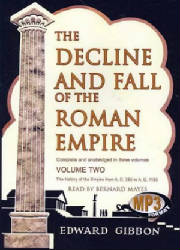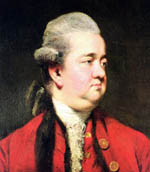|
|
We
invite you to read the first 180 years of "Forbidden
History", FREE!
"History
is indeed little more than the register of the crimes,
follies and misfortunes of mankind."
Edward Gibbon, English historian
(1737-1794)
From:
"The Decline and Fall of the Roman Empire"
.
.
NWO FORBIDDEN
HISTORY:
TIMELINE OF THE
NEW WORLD ORDER
1763-1816

|
|
Meyer Amschel
Rothschild: Founding Father of THE NEW WORLD
ORDER |
|
1763
BIRTH OF THE NEW WORLD ORDER
THE
ROTHSCHILD BANKING DYNASTY IS ESTABLISHED
|
Mayer Amschel
Rothschild establishes the
Rothschild international banking dynasty, the
most successful family business in history.
Forbes Magazine today refers to him as
"a founding father of international
finance".
The original Rothschild operation is based in
Frankfurt, Germany. Rothschild’s five sons later
branch out to head banking dynasties in Germany,
Austria, Italy, France, and England. They became
financiers to the Kings of Europe, often
financing both sides of the European wars that
will so enrich them.
To this day,
the House of Rothschild and its allies remain
the dominant force behind international finance,
Central Banking, Globalism, “environmentalism”,
and radical left-wing politics. The
Jewish-Zionist Rothschild Family also played a
major role in establishing Israel in the
1900’s.(Zionism)
Mayer Amschel Rothschild can truly be called the
original “GodFather” of the
New World Order
crime gang. |
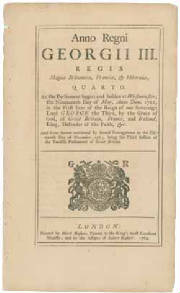
|
|
Orders from
London: "Do not issue your own currency!" |
|
1764
.
THE
CURRENCY ACT FORBIDS THE AMERICAN COLONIES FROM
ISSUING THEIR OWN DEBT-FREE CURRENCY |
The Currency Act of 1764 is a British action
that imposes a monetary policy on its American
colonies.. The Act extends the provisions of the
Currency Act of 1751 and forbids the American
colonies from issuing debt-free paper currency
as legal tender.This creates financial
difficulty for the colonies. Benjamin Franklin,
the colonies’ representative in London, urges
the British to reject the Currency Act.
The Currency Act creates great tension between
the colonies and the mother country. When the
First Continental Congress meets in 1774, it
objects to The Currency Act as "subversive
of American rights" and calls for its
repeal. .
It is a little known fact of the
American Revolution, that the right of the
colonial governments to issue their own
debt-free currency, and spend it into
circulation (as opposed to a private Central
Bank printing and lending its debt-currency into
circulation), was one of the main causes of
the coming American Revolution. |
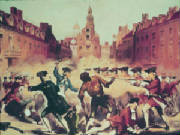
|
|
The Boston
Massacre |
|
MAR 5 1773
THE
BOSTON MASSACRE
TENSIONS HEAT UP AS FIVE AMERICAN
COLONISTS ARE KILLED BY BRITISH TROOPS |
The increase in British troops stationed in
Boston leads to a tense situation that erupts in
brawls between soldiers and liberty loving
civilians. British troops were sent to Boston in
1768 to help officials enforce the Townshend
Acts, a series of laws passed by the British
Parliament. The purpose of the Townshend Acts is
to make colonial governors and judges
independent of colonial control, to enforce
compliance with trade regulations, and to tax
the colonies without their approval.
When an angry crowd of colonists confronts a
group of soldiers with taunts and snowballs, the
frightened British soldiers overreact. Shots are
fired and five American colonists are killed.
News of the Boston Massacre spreads the
revolutionary spirit throughout the colonies. |
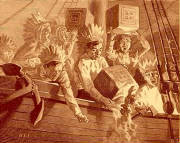
|
|
The Boston Tea
Party |
|
DEC 16 1773
THE BOSTON TEA PARTY
AMERICAN COLONISTS REBEL AGAINST
BRITISH TAXES AND MONOPOLIES |
The Boston Tea Party is an action by Boston
colonists in the British colony of
Massachusetts, against the British government
and the monopolistic East India Company that
controlled all the tea coming into the colonies.
After officials in Boston refuse to return three
shiploads of taxed tea to Britain, a group of
colonists, dressed as American Indians, board
the ships and destroy the tea by throwing it
into Boston Harbor.
The Tea Party is the culmination of a resistance
movement against the Tea Act, which had been
passed by Parliament in 1773. Colonists object
to the Tea Act for a variety of reasons,
especially because it violates their right to be
taxed only by their elected representatives. The
Boston Tea Party is a revolt against state
sponsored monopolies (The British East India
Company) as much as it is about taxation. |
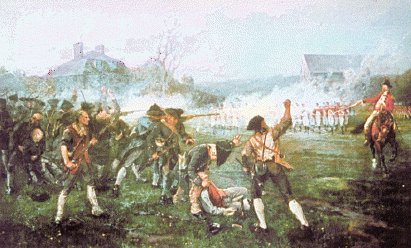
|
|
Lexington and
Concord |
|
APRIL 19
1775
THE BATTLE OF LEXINGTON & CONCORD
AMERICAN REVOLUTION BEGINS WITH “THE
SHOT HEARD AROUND THE WORLD” |
The Massachusetts Militia is storing guns and
ammo in the town of Concord, MA. About 700
British troops are sent to capture and destroy
the military supplies. Patriot leaders have
learned of the British plans and begin
organizing. The night before the scheduled
British raid, Paul Revere takes off on his
famous "midnight ride" to warn the local
militiamen (Minutemen).
The first shots are fired just as the sun begins
to rise in Lexington, MA. The militias are
outnumbered and fall back as the British advance
upon Concord. At Concord, approximately 500 "rag
tag" militiamen fight and defeat the King's
troops. The "red coats" retreat after a pitched
battle in open territory. More militiamen arrive
soon thereafter and inflict heavy damage on the
British, firing upon from behinds trees as they
march back towards Boston. The war for American
independence is on! The Battle of Lexington and
Concord will go down in history as "the shot
heard around the world." |
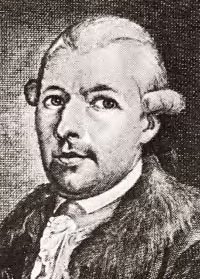
|
|
Weishaupt devised
the first Globalist-Communist Conspiracy. |
MAY 1 1776
.
MAY DAY
ADAM WEISHAUPT ESTABLISHES THE SECRET ORDER OF
THE ILLUMINATI |
Adam Weishaupt, a German-Jewish professor, forms
the order of
The Illuminati
on May 1, 1776 in Bavaria (Germany). He is most
likely a paid agent of Rothschild, who is also
based in Germany. Weishaupt (code name
Spartacus) recruits wealthy elites to his
secret society. The Illuminati (Enlightened
Ones) infiltrate Masonic lodges, which serve as
cover for their activities. They plot the
overthrow of governments, the destruction of
Christianity, and the establishment of a world
communal state,
(New World Order) which future
elites will one day rule.
Bavarian authorities disband the Illuminati in
1784. But the tactics and goals of the order are
clearly visible in the French Revolution of
1789, and also latter day Globalist & Communist
plots. To this day, May 1 (May Day) remains an
important date to Communists, Anarchists,
Socialists, and Progressives. |
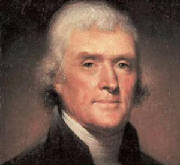
|
|
Thomas Jefferson
wrote the Declaration of Independence. |
|
JULY 4 1776
.
.
THE DECLARATION OF
INDEPENDENCE IS SIGNED IN PHILADELPHIA
|
Written by Thomas Jefferson and signed by 56
American patriots, the Declaration of
Independence breaks the colonies away from
Britain, and sets forth the ideal that
governments exist to protect and serve the
people, not to control them. America’s founders
believe that rights come from God, not
government. Liberty and prosperity follow when
government is restricted in size and power.
Decentralized, limited government, God-given
rights, a moral foundation, solid debt-free
currency, respect for private property rights,
and minimal taxation represent the opposite
of what the Illuminati and the latter day French
and Marxist revolutionaries advocate.
The most well-known lines of the Declaration sum
up what America is all about:
"We hold these truths
to be self-evident, that all men are created
equal, that they are endowed
by their Creator
with certain unalienable
Rights that among these are Life, Liberty and
the pursuit of Happiness. --That to secure these
rights, Governments are instituted among Men,
deriving their just powers from the consent of
the governed, --That whenever any Form of
Government becomes destructive of these ends, it
is the Right of the People to alter or to
abolish it, and to institute new Government.” |
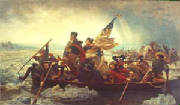
|
|
Washington crosses
the Delaware River to surprise the British and
Hessian troops on Christmas Day. |
|
1775-1783
.
.
AMERICA’S WAR
FOR INDEPENDENCE
|
The American Revolutionary War, (aka the War for
Independence) starts off badly for the 13
American colonies. The colonists themselves are
deeply divided as to their loyalties. The best
that General George Washington’s “Continental
Army” can do against the well-trained, better
equipped British is to limit direct combat and
harass the British instead. As American
“minutemen” and Washington’s Army draw the
British into a battle of attrition, Benjamin
Franklin visits Paris to sell the French on the
idea of helping the colonies to gain
independence.
After Washington’s stunning Christmas Day 1776
surprise offensive against the British & their
Hessian mercenaries, followed by the American
victory at Saratoga in October ‘77, the French
are sold! French military assistance will play a
pivotal role in reversing the course of the war.
The British grant the colonies independence in
1783. |
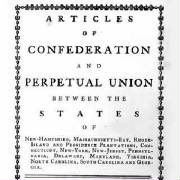
|
|
The United States
originally operated under The Articles of
Confederation. |
|
1781-1788
.
.
THE COLONIES
OPERATE UNDER “THE ARTICLES OF
CONFEDERATION AND
PERPETUAL UNION”
AS THEIR MUTUAL CONSTITUTION
|
Drafted during the early years of the war, and
ratified in 1781, the Articles Of
Confederation and Permanent Union establish
a decentralized government for the colonies.
Under the Articles, the colonies (now referred
to as “States’) are sovereign entities. For a
full six years after the end of the war, The
United States is not a nation, but rather a
league of allied states living under mutually
agreed upon rules.
Even during the war, America’s founders were
divided. Though all of the founders believe in
freedom and limited government, one camp (The
Federalists) prefers a stronger central
government to help organize the nation’s
affairs. The other camp (the anti-Federalists)
fear that any centralized American
government might become corrupted and dangerous
to the people’s liberty.
|
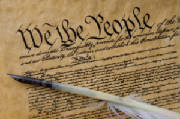
|
|
The US
Constitution strictly limits the size and power
of the Federal Government. |
|
JUNE 21
1788
.
THE UNITED STATES
CONSTITUTION IS RATIFIED
.
GOVERNMENT POWER AND SIZE ARE
STRICTLY LIMITED
|
Some of America's founders believe that the
Articles of Confederation are too weak for the
government to survive. For this reason, the
Continental Congress approves the US
Constitution in 1787, in Philadelphia. Months of
contentious debate follow before the States
ratify the Constitution, the framework of the US
Government.
The checks and balances built into the
Constitution establish 3 branches of government,
and limit the power of each. George Washington
will be chosen as the first US President.
The document also
limits the power of the masses of people.
.
The founders know that "democracy” results in
mob rule, in which a "majority" of people can be
manipulated into voting themselves the wealth of
the productive people. Under the Constitution,
taxes and state spending are minimal, and only
gold and silver coins are recognized as
currency. There is no authorization for income
taxes, central banking, and social welfare
schemes.
.
The Constitution and its original 10 amendments
(The Bill of Rights) serve as a leash
on government growth and power, and a guarantor
of personal liberties, such as the right to free
political speech, the right to bear arms, and
the right to be secure from unlawful searches
and seizures.
.
The United States
is founded as a constitutional republic
(rule of law), and NOT a socialist
"democracy" (rule of the manipulated
majority).
|
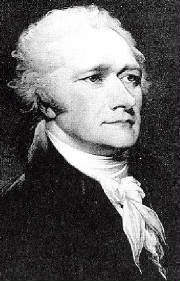
|
|
Hamilton was a
tool of the London Bankers. |
|
1790
.
.
ALEXANDER HAMILTON CLASHES
WITH THOMAS JEFFERSON OVER THE FOUNDING OF A
CENTRAL BANK |
The First Bank of the United States is to be a
Central Bank with a 20-year charter. It is the
brainchild of New York banker Alexander
Hamilton. Hamilton, born in the British West
Indies and
educated in a
Jewish school there, is an
agent of the New York-London moneylenders.
Hamilton founded the Bank of New York in 1784.
As President Washington's Treasury Secretary,
Hamilton clashes with Secretary of State Thomas
Jefferson. Hamilton and the New York merchant
class believe in strong central government and
central banking. Virginians Jefferson, James
Madison (father of the Constitution) and the
southern agricultural class believe in
decentralized government and local banking. The
roots of the future American Civil War can be
traced, in part, to the Jefferson-Hamilton feud.
Jefferson argues that centralization of power
away from private mints and banks is
unconstitutional and dangerous. He wrote:
"…banking
establishments are more dangerous than standing
armies." The New Yorker
Hamilton argues that if the nation is to grow,
it needs a standard coinage provided by a US
Mint and supported by a Central Bank and excise
tax.
|
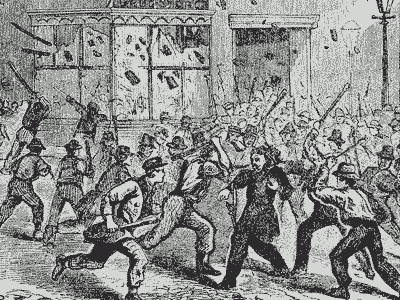
|
|
When men were men!
Pennsylvania farmers attack the tax collectors
of Hamilton's Central Bank. |
|
FEB 1791
.HAMILTON
WINS
. ESTABLISHES AMERICA’S FIRST PRIVATELY OWNED CENTRAL BANK
.WHISKEY
FARMERS REBEL
|
President Washington listens to Jefferson’s and
Hamilton’s position on the Central Bank, but is
ultimately taken in by Hamilton. The Father of
America has a blind spot when it comes to the
smooth talking, foreign- born deceiver. Others
are not so easily fooled. In later years,
President John Adams will describe Hamilton as:
"the most
restless, impatient, artful, indefatigable, and
unprincipled intriguer in the United States, if
not in the world."
Along with establishing a mint and an excise
tax, Hamilton’s Bank is a private company with
foreign banker shareholders. To cover the
government's interest payments to the Bank,
Hamilton imposes an excise tax on whiskey.
When Pennsylvania whiskey farmers rebel
(The Whiskey
Rebellion), Hamilton
convinces Washington to allow him to personally
lead 12,000 troops to enforce compliance.
Government force is now used to collect taxes
needed to pay interest to the foreign
shareholders of America's Central Bank.
|

|
|
Central Banking
creates a debt based currency that eventually
enslaves everyone to debt. |
|
THE CENTRAL BANKING SCAM
.
PRIVATELY OWNED CENTRAL BANKS CREATE
DEBT-BASED PAPER MONEY AND THEN COLLECT INTEREST
|
CENTRAL BANKING AND GOVERNMENT DEBT
When big government uses up the money it
collects in taxes, it then resorts to borrowing.
It can borrow by selling bonds to investors, or
to foreign governments.
But when governments
borrow from a privately owned Central Bank, the
Bank is actually creating new money "out of thin
air" and then lending it to the government at
interest. The injection of new
money into the economy has the effect of
reducing the value of all existing money
(inflation). The government must then tax its
citizens to repay the loans (Bonds) to the
Central Bank, plus interest.
If the government were to simply create its own
debt-free currency to cover its bills, there
might still be an inflationary effect, but the
government would not carry debt, and therefore
not need to tax its people to pay principal and
interest to the Central Bank.
It makes no sense for a government to pay
interest to a Central Bank on new currency when
it can simply create the new currency itself,
interest free!
CENTRAL BANKING AND LOCAL BANK DEBT
The other method in which the Central Banks prey
upon the people is by lending to the nation’s
banks. The banks can then increase the number of
loans to their customers by borrowing money
themselves from the Central Bank (again,
created out of thin air.) The local bank
borrows at a lower rate from the Central Bank,
and then re-loans the money to its customers at
a higher rate. Consumer debt is thus maximized
as constant inflation erodes the value of
existing money.
Consumers do not
benefit from debt as much as they would believe
because the new money pumped into the economy
artificially drives up the price of whatever
they are buying (bubbles).
In short, behind
its academic cover, Central Banking is just
another term for legalized counterfeiting and
loan sharking. When a Central
Bank, owned by well-connected private
shareholders, controls the money supply, every
dollar of currency must be loaned into
circulation at interest. Therefore,
there will always be more total debt outstanding
than there ever is money in circulation.
Those who control this perpetual debt machine
always become powerful enough to control the
nation itself.
For a better understanding of how the Central
Banking scam works, refer to the entertaining
allegory of
The Great Tomato
Bubble. |
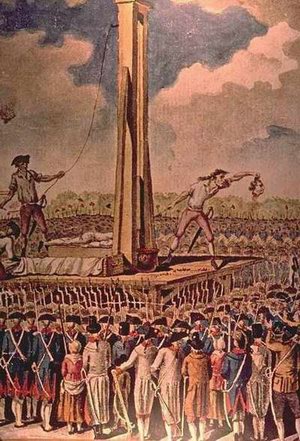
|
|
The French
Revolution spawned an orgy of murder and terror. |
|
1789-1799
.
.
.
THE
FRENCH REVOLUTION AND THE REIGN OF TERROR
|
The French Revolution is a period of radical
upheaval in France. Unlike America’s Revolution,
which put limits on government power, the
atheistic radicals of France seek total power.
Their rallying cry of "Liberty, Fraternity,
Equality" are empty words that attract
gullible mobs.
.
The revolution leads to the rise of a mad killer
named Robespierre and the
Jacobins.
From 1793-1794, the “Committee of Public Safety”
operates as the dictatorship of France. A “Reign
of Terror” is unleashed. King Louis XVI , Queen
Marie Antoinette, and 40,000 others are
executed, mostly by public guillotine. The
Jacobins mobs target priests, nuns, and the
wealthy.
.
The Jacobins (forerunners of the Communists) are
eventually displaced by more sensible elements
of the revolution. Robespierre himself is then
executed. The “Directory” controls France from
1795-1799 as the monarchies of Europe wage a war
against France.
.
Though historians portray The Revolution as a
"spontaneous uprising" of the oppressed, the
funding of the movement, and the disciplined
organization of the radicals, suggest otherwise.
Was Rothschild money behind the revolt? Could
this be the meaning of the French Revolution’s
theme color, red? (Rothschild is German for
"Red Shield").
Many more "spontaneous red revolts" will follow
over the centuries to come. |
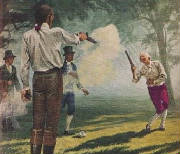
|
|
Weehawken, NJ: The
arrogant London tool finally got what was coming
to him. |
|
1795 / 1804
.
THE FALL AND DEATH OF
ALEXANDER HAMILTON.
|
.
In 1795, banker tool Alexander
Hamilton resigns in disgrace when it is
discovered that he is sleeping with another
man’s wife
(Maria Reynolds Affair).
.
On July 11, 1804, Hamilton is
killed in a duel with Thomas Jefferson’s Vice
President, Aaron Burr, a political rival whom
the arrogant Hamilton had insulted and defamed.
. |
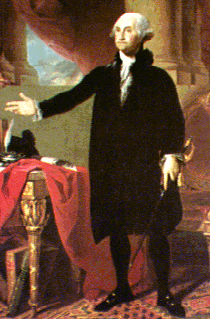
|
|
Washington warned
of the dangers to come. |
.
|
SEPT 17 1796
.
.
GEORGE WASHINGTON’S FAREWELL ADDRESS PREDICTS
THE FUTURE
|
In his
Farewell Address
to Congress and an adoring
American public, the great General and President
George Washington uses the occasion to advise
America on how to secure its future happiness
and prosperity. Washington's prophetic warnings
come from his extensive knowledge of history.
His wise and prophetic advice includes:
*Beware
of the formation of political parties.
*Maintain
religion and morality as supports of a free
people.
*Avoid
alliances & foreign military entanglements.
*Balance
the Federal Budget and avoid state debt.
*Keep
government spending and taxes low.
*Do
not weaken the US Constitution with amendments.
*Do
not allow sectional differences to divide the
Union.
In Europe, the early
New World Order/Red
crime gang is already in operation. Eventually,
the Globalists will attack America (and the
world) in each area that Washington warned
about. |
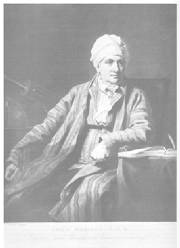
|
|
Robison the first
researcher to expose the conspiracy. |
|
1798
JOHN ROBISON PUBLISHES “PROOFS OF A
CONSPIRACY AGAINST THE RELIGIONS AND GOVERNMENTS
OF EUROPE” |
John Robison was a prominent physicist and
professor of philosophy at Scotland’s Edinburgh
University. He worked with James Watt on the
early steam car, and he later invented the
siren. The Illuminati had attempted to recruit
him but he declined. In 1798 he writes
“Proofs of a Conspiracy
Against the Religions and Governments of Europe”
in which he exposes the secret societies behind
the terrorist French revolution.
His warning to Europe is stark:
"An association
has been formed for the express purposes of
rooting out all the religious establishments and
overturning all existing governments ... the
leaders would rule the World with uncontrollable
power, while all the rest would be employed as
tools of their unknown superiors." |
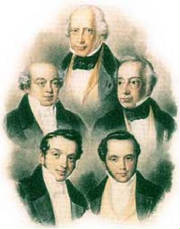
|
|
The Brothers
Rothschild spread their tentacles across Europe. |
|
1798-1815
.
.
.
THE FIVE SONS OF ROTHSCHILD
SPREAD THEIR MONEY LENDING EMPIRE ACROSS EUROPE |
After amassing an enormous fortune from his base
in the Hessian city of Frankfurt (Germany) Mayer
Amschel Rothschild sends his five sons abroad to
expand the Rothschild Family Empire throughout
Europe. Each of the brothers will emerge as
dominant financial players, and
behind-the-scenes political players, in their
respective new countries. The five sons and the
five sub-dynasties they will operate are as
follows:
Anselm: Stays in Frankfurt to
run the German operation.
Salomon: Vienna, Austria
Nathan: Manchester, and then
London, England
Carl: Naples, Italy
Jacob: Paris, France
Of the 5, Nathan in London ("The City of
London") will become the wealthiest and most
powerful of the brothers. His power surpasses
even that of the other existing Jewish family
dynasties that own The Bank of England
(Montefiores,
Goldsmids,
Mocattas).
The London Rothschilds are the beating heart of
the centuries old movement to tear down European
civilization and erect
The New World Order
in its place. |
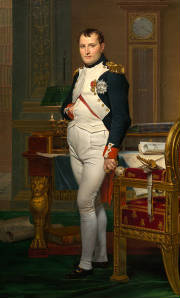
|
|
Napoleon emerges
from the chaos of France and restores order.
|
|
1799
.
THE
RISE OF NAPOLEON BONAPARTE
|
Military leader
Napoleon Bonaparte
emerges from the Revolutionary chaos of France
to restore order. He installs himself as First
Consul in 1799. Five years later, the French
Senate declares him Emperor of France. As
Emperor from 1804-1815, Napoleon will establish
legal reforms known as the Napoleonic Code.
.
Napolean's expedition in Egypt is a large part
of why we know so much about Ancient Egypt. He
brought a team of 160 scientists, astronomers,
engineers, architects, artists, interpreters,
and printers to record and document what he
found.
The Royal Families of Europe continue to wage
war on revolutionary France. Britain, Russia,
Austria, Prussia, and Spain unite in opposition
to Napoleon. The ensuing wars that follow are
known as the Napoleonic Wars, although Napoleon
didn't start these wars so much as he inherited
them.
.
After a string of stunning victories, France
establishes itself as the leading continental
power of Europe and builds alliances of its own. |
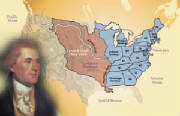
|
|
President
Jefferson's purchase of the Louisiana Territory
helps Napoleon to finance the war. |
|
1803
THE
LOUISIANA PURCHASE
RATHER THAN BORROW
FROM THE BANKERS, NAPOLEON SELLS LOUISIANA TO
THE UNITED STATES
|
Napoleon needs money to finance France’s war
effort against the European powers, but he is
opposed to the idea of government debt to
Central Bankers. Napoleon once wrote:
.
"When a
government is dependent upon bankers for money,
they and not the leaders of the government
control the situation, since the hand that gives
is above the hand that takes. Money has no
motherland; financiers are without patriotism
and without decency; their sole object is gain.'
Instead of crawling to Rothschild, one of the
ways in which Napoleon raises money is by
selling the massive Territory of Louisiana to
the United States. In so doing, he also closes a
possible front in the western hemisphere from
which Britain could wage war against French
territory. |
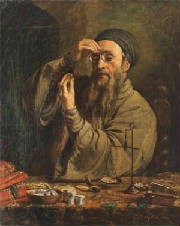
|
|
For centuries,
Jews have dominated the practice of money
lending. Napolean wants to regulate them. |
|
MAY 17
1808
.
NAPOLEON ISSUES
“THE INFAMOUS DECREE”
AGAINST MONEY LENDING
|
In response to growing complaints about Jewish
(and other) moneylenders, Napoleon had, in 1806,
suspended all debts owed to moneylenders. In
1808, he goes a step further and issues a decree
that the money lenders refer to as
"The Infamous Decree."
.
Napoleon wants the Jews to move away from their
traditional money lending practices and become
farmers and craftsmen instead. His decree
severely restricts the practice of lending, and
annuls all debts owed by married women, minors,
and soldiers. Any loan that had an interest rate
exceeding 10 percent is also annulled.
Napoleon is very tolerant in his attitude
towards the Jews of France. and he is admired by
many of them. But his efforts to regulate usury
upsets the Jewish financiers and seals his fate.
That is why they refer to Napolean's decree as
'The Infamous Decree."
The
Rothschild Brothers of Europe are determined to
destroy Napoleon before his anti-debt monetary
philosophy can take hold in Europe. |
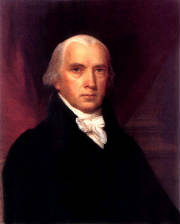
|
|
James Madison
opposes the recharter for the Central Bank. |
|
1811
.
.
THE
BANK OF THE UNITED STATES IS KILLED AS TENSIONS
WITH GREAT BRITAIN RISE
|
The 20-year charter of Alexander Hamilton’s
Monster is set to expire. President James
Madison had opposed the Bank in 1791, and has no
desire to renew the charter. The “Federalists”
(Hamiltonians) in Congress favor its renewal and
close relations with Britain. The
“Democratic-Republicans” (Jeffersonians) want to
kill the Bank and view Britain with suspicion.
The vote to renew the charter is close, but the
anti-Bank faction prevails. The New York-London
Bank is allowed to die. At this time in history,
the British are “coincidentally” escalating
tensions with America. Britain is at war with
Napoleon and is blockading France. Under the
blockade, US ships are being harassed and
sailors taken prisoner. The young American
Republic appears to be headed for a 2nd
war with its ex ‘Mother Country”, which by now
belongs to Nathan Rothschild and friends. |
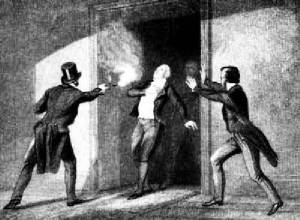
|
|
The murder of
Perceval makes war with the United States
inevitable. |
|
MAY 11 1812
.
.
.
BRITISH PRIME MINISTER SPENCER PERCEVAL
ASSASSINATED JUST BEFORE HE CAN MAKE PEACE WITH
THE UNITED STATES
|
British Prime Minister Spencer Perceval enters
the lobby of the House of Commons. He is
on his way to a meeting whose purpose is to
discuss how to diffuse the rising tensions with
the United States. A man named John
Bellingham then draws a pistol and shoots
Perceval at close range. Pereceval dies.
Bellingham is tried and hanged just one week
later.
In 1787, Bellingham was a midshipman on a
vessel that was taken over by mutineers and
sunk. In 1803, he briefly worked in Russia,
where he was imprisoned for sabotaging a Russian
ship, also lost at sea. These incidents suggest
that Bellingham is a political radical, and not
just a "crazed lone gunman". The odd manner in
which Bellingham is so quickly executed, the
lack of investigation into a possible broader
conspiracy, his link to a mutiny, his arrest in
Russia, and the looming Bank war with America,
all suggest that Bellingham may be a radical
patsy, used by higher authorities to eliminate a
disobedient Prime Minister.
This is the first in a long series of
political murders, and attempted murders, that
will plague Europe and America for the next 200
years. In many of these cases, it will be an
emotionally unstable radical who is used to
carry out the evil deed. |
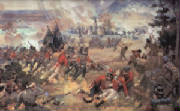
|
|
Britain invades
the United States after Central Bank is killed. |
|
JUNE 18 1812
.
.
THE
STRANGE WAR OF 1812 BEGINS
.
1812-1814
|
The murder of Prime Minister Perceval delays the
effort to improve relations with the United
States. Had Perceval lived, the British wartime
policy of European trade restrictions and
harassing of American vessels would have been
lifted, and peace maintained. Perceval’s death
delays the rescission order, and war commences
just 5 weeks after the assassination. The same
Hamiltonian-Federalists, who wanted to
re-charter The Central Bank, also oppose
Madison’s decision to fight the British. After
the war ends in 1814, the Federalists will be
perceived as unpatriotic and their political
party collapses.
Perceval’s successor, Robert Jenkinson (Lord
Liverpool) will later lift the trade restriction
orders, which are the stated cause of the war.
But by that time, the gesture is meaningless as
the war is already started. Whether Liverpool
was being sincere, or whether he was just trying
to shift the blame for war onto the United
States, is open for debate.
|
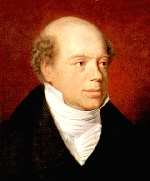
|
|
Nathan Rothschild:
His loans to Britain defeated Napoleon. |
|
1812-1814
.
.
THE
ROTHSCHILD FAMILY SINGLE HANDEDLY FINANCES THE
WAR AGAINST NAPOLEON
|
From his base in London's financial district,
(“The City”)
Nathan Rothschild
finances the war to defeat Napoleon. Shipments
of gold to the European continent fund the Duke
of Wellington's armies and also those of
Britain's allies. The Rothschild brothers
co-ordinate their activities across the
continent, and develop a network of agents,
shippers, and couriers to transport gold across
war-torn Europe.
The combination of Rothschild money, allied
manpower, and a harsh Russian winter prove too
much for the French. Napoleon's generals force
him to abdicate in April of 1814. King Louis
XVIII is installed as ruler of France. Napoleon
is exiled to the island of Elba off the Italian
coast, where he is given authority over the
island's 12,000 inhabitants. |
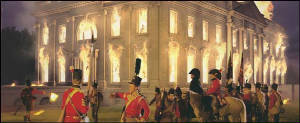
|
|
The British burn
the White House before a tornado chases them
away. |
|
AUGUST 24 1814
.
THE
BRITISH INVADE WASHINGTON AND BURN THE WHITE
HOUSE
|
British forces occupy Washington DC. They set
fire to the White House and other important
buildings including the Treasury, The Capitol,
and the Library of Congress. Less than two days
after sacking Washington, the British are forced
to leave when a violent hurricane with tornado
tears through Washington. The freak storm
extinguishes most of the fires, kills British
troops, and damages many of their ships.
President Madison and the rest of the government
then quickly return to the Capitol City. Legend
has it that a storm sent by “Divine Providence”
drove the British away. Later that same year,
Britain and the US will make peace. |
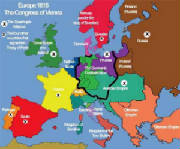
|
|
The Congress of
Vienna consolidated German states and redrew
European borders. |
|
1814-1815
.
.
BALANCE OF POWER POLITICS
.
THE
CONGRESS OF VIENNA RESHAPES EUROPE
|
After Napoleon’s defeat of 1814, the powers of
Europe hold a series of meetings in Vienna,
Austria. Political boundaries are redrawn and
old disputes are settled. These conferences are
known as
‘”The Congress of
Vienna” Though many nations
participate, the Congress is headed by the “Big
Four” of Britain, Prussia, Russia, and Austria.
One of most notable decisions reached at Vienna
is the consolidation of 360 small German states,
into a German Confederation of 38 states.
Arrangements
made by the Four Great Powers ensure that future
disputes will be settled in a manner that will
avoid the wars of the previous twenty years.
Although the Congress of Vienna preserves the
“balance of power” in Europe, it does not check
the spread of the Red revolutionary movements
that are being born, and will spread across
Europe some 30 years later.’
"Balance of Power” politics serves the interests
of the Globalist planners in that it allows for
a disobedient nation, or nations, to be checked,
challenged, and controlled, by another nation,
or nations, of equal power. The Rothschilds and
their agents will soon wield enormous financial
influence within three of the four “Big Four”,
as well as post-Napoleonic France.
Only Russia still remains
totally free of Rothschild’s reach. |
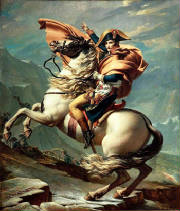
|
|
The legend of
Napoleon Bonaparte grows after his escape from
Elba. |
|
FEB 26, 1815
.
.
NAPOLEON ESCAPES FROM ELBA!
RETURNS TO POWER IN FRANCE
|
Separated from his wife and son, and aware of
rumors that he might be shipped to a remote
island in the middle of the Atlantic, Napoleon
stuns Europe by escaping from Elba with a
handful of supporters and soldiers. Upon landing
on the French mainland, a regiment of French
soldiers confronts him. Napoleon approaches the
regiment alone, dismounts his horse and shouts,
"Here I am. Kill your Emperor, if you wish."
The soldiers respond with, "Long Live the
Emperor!" and march with Napoleon to Paris!
King Louis XVIII flees. On March 13, 1815,
Britain, Prussia, Russia, and Austria declare
that they will end his rule. Napoleon quickly
raises another army. He will again confront the
Rothschild funded British and Prussians at the
decisive Battle of Waterloo in Belgium. |
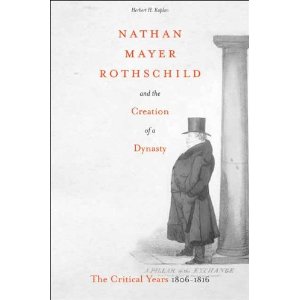
|
|
Nathan Rothschild
watched expressionless from his usual pillar as
he financially conquered Britain. |
|
JUNE 18 1815
.
.
NATHAN ROTHSCHILD USES ADVANCE INFORMATION OF
NAPOLEON'S DEFEAT AT WATERLOO TO FINANCIALLY
CAPTURE BRITAIN
|
The Rothschild Brothers utilize courier pigeons
to rapidly communicate amongst themselves and
their agents. The network provides Nathan
Rothschild with political and financial
information ahead of his peers, giving him an
advantage in the financial markets. After the
final defeat of Napoleon at Waterloo (Belgium),
Rothschild receives word of the battle's outcome
long before anyone else. He uses the "insider
information" of Wellington's victory to become
Britain’s supreme master.
Rothschild orders his brokers to sell off his
holdings. Other stockbrokers assume that
Rothschild has therefore learned that Britain
has lost at Waterloo. A panic sell off drives
the market down to historic lows.
Rothschild then buys up the devalued market at
bargain prices.
.
When the public learns of Britain’s victory
over Napoleon, the stocks skyrocket to new
heights!
Nathan Rothschild
multiplies his already massive fortune by as
many as 20 times! The
House of Rothschild is now the supreme financial
master of Great Britain.
Napoleon is exiled to the island of St. Helena,
1000 miles off the coast of West Africa. He will
die from what appears to be arsenic poisoning in
1821. |
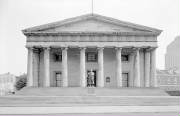
|
|
By 1819, America's
2nd Central Bank has already created a
devastating real estate boom/bust cycle. |
|
1816
.
THE
BEAST IS BACK!
.
THE 2ND CENTRAL BANK OF THE UNITED STATES
IS ESTABLISHED
|
Five years after America’s Central Bank was
killed, and just two years after the White House
is burned, the Second Bank of the United States
is chartered by many of the same Congressmen who
voted against the re-charter in 1811. After the
War of 1812, Madison and other anti-Bank
Jeffersonians had a “change of heart” when they
found it difficult to cover war debts. Was there
a deal made to re-establish a Bank in order to
call off Rothschild's British attack dogs?
.
The timing of the re-charter, the timing of the
Perceval assassination, the timing of the war,
and the sudden decision to now accept a Central
Bank, suggest that the very strange War of 1812
was actually a Bank War. Like the first Bank,
this one also has a 20 year charter, is also a
privately held corporation, and its principal
shareholders are also linked to the New
York-London axis. The Bank has the power to
engineer debt driven "booms" by creating money
"out of thin air" and then lending it into the
economy at interest.
By 1819, the Bank will already have created its
first boom-bust real estate bubble. The Bank's
easy debt money drove prices up, and its "tight
money" adjustment drove prices down. When
The Bubble of 1819
pops, borrowers are unable to repay their
original loans as their property values crashes.
|
GO TO NWO FORBIDDEN HISTORY (1820-1880)
|



